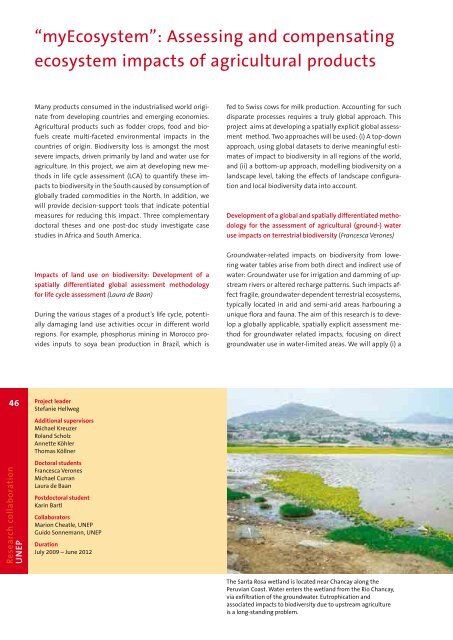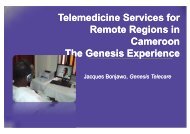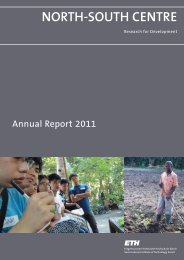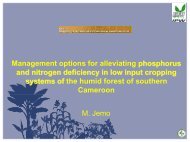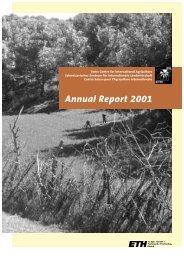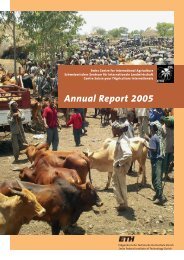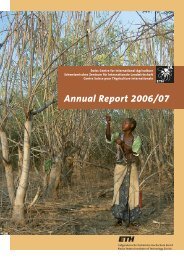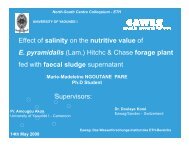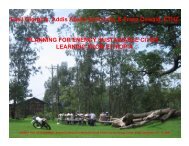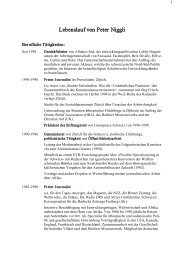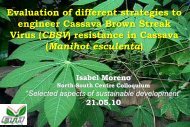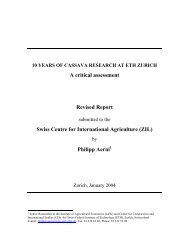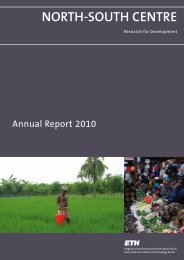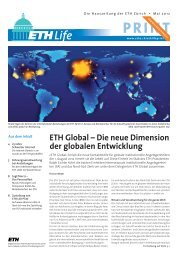NORTH-SOUTH CENTRE - ETH - North-South Centre North-South ...
NORTH-SOUTH CENTRE - ETH - North-South Centre North-South ...
NORTH-SOUTH CENTRE - ETH - North-South Centre North-South ...
Create successful ePaper yourself
Turn your PDF publications into a flip-book with our unique Google optimized e-Paper software.
“myEcosystem”: Assessing and compensating<br />
ecosystem impacts of agricultural products<br />
Many products consumed in the industrialised world originate<br />
from developing countries and emerging economies.<br />
Agricultural products such as fodder crops, food and biofuels<br />
create multi-faceted environmental impacts in the<br />
countries of origin. Biodiversity loss is amongst the most<br />
severe impacts, driven primarily by land and water use for<br />
agriculture. In this project, we aim at developing new methods<br />
in life cycle assessment (LCA) to quantify these impacts<br />
to biodiversity in the <strong>South</strong> caused by consumption of<br />
globally traded commodities in the <strong>North</strong>. In addition, we<br />
will provide decision-support tools that indicate potential<br />
measures for reducing this impact. Three complementary<br />
doctoral theses and one post-doc study investigate case<br />
studies in Africa and <strong>South</strong> America.<br />
fed to Swiss cows for milk production. Accounting for such<br />
dispa rate processes requires a truly global approach. This<br />
project aims at developing a spatially explicit global assessment<br />
method. Two approaches will be used: (i) A top-down<br />
approach, using global datasets to derive meaningful estimates<br />
of impact to biodiversity in all regions of the world,<br />
and (ii) a bottom-up approach, modelling biodiversity on a<br />
landscape level, taking the effects of landscape configuration<br />
and local biodiversity data into account.<br />
Development of a global and spatially differentiated methodology<br />
for the assessment of agricultural (ground-) water<br />
use impacts on terrestrial biodiversity (Francesca Verones)<br />
Impacts of land use on biodiversity: Development of a<br />
spatially differentiated global assessment methodology<br />
for life cycle assessment (Laura de Baan)<br />
During the various stages of a product’s life cycle, potentially<br />
damaging land use activities occur in different world<br />
regions. For example, phosphorus mining in Morocco provides<br />
inputs to soya bean production in Brazil, which is<br />
Groundwater-related impacts on biodiversity from lowering<br />
water tables arise from both direct and indirect use of<br />
water: Groundwater use for irrigation and damming of upstream<br />
rivers or altered recharge patterns. Such impacts affect<br />
fragile, groundwater-dependent terrestrial ecosystems,<br />
typically located in arid and semi-arid areas harbouring a<br />
unique flora and fauna. The aim of this research is to develop<br />
a globally applicable, spatially explicit assessment method<br />
for groundwater related impacts, focusing on direct<br />
groundwater use in water-limited areas. We will apply (i) a<br />
46<br />
Research collaboration<br />
UNEP<br />
Project leader<br />
Stefanie Hellweg<br />
Additional supervisors<br />
Michael Kreuzer<br />
Roland Scholz<br />
Annette Köhler<br />
Thomas Köllner<br />
Doctoral students<br />
Francesca Verones<br />
Michael Curran<br />
Laura de Baan<br />
Postdoctoral student<br />
Karin Bartl<br />
Collaborators<br />
Marion Cheatle, UNEP<br />
Guido Sonnemann, UNEP<br />
Duration<br />
July 2009 – June 2012<br />
The Santa Rosa wetland is located near Chancay along the<br />
Peruvian Coast. Water enters the wetland from the Rio Chancay,<br />
via exfiltration of the groundwater. Eutrophication and<br />
associated impacts to biodiversity due to upstream agriculture<br />
is a long-standing problem.


